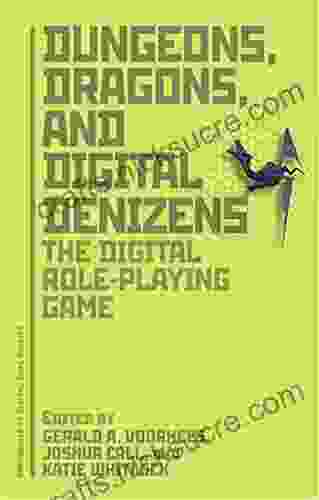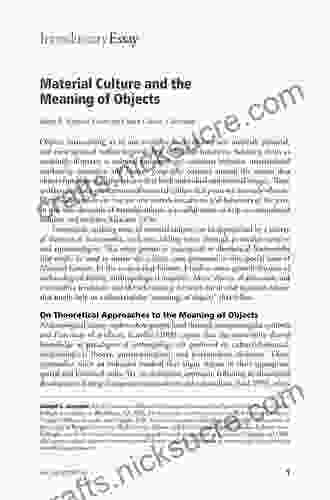From the Steam Engine to the Search Engine: A Journey of Automation and Innovation

The history of automation and innovation is a fascinating one, with roots that stretch back to the early days of the Industrial Revolution. From the steam engine to the search engine, humans have been constantly striving to create machines and systems that can make our lives easier and more efficient. This article will explore the evolution of automation and innovation, from its humble beginnings to its current state-of-the-art advancements.
The Early Days of Automation
The first examples of automation can be traced back to the ancient world, with devices such as the waterwheel and the windmill being used to harness natural forces to perform tasks such as grinding grain and pumping water. However, it was during the Industrial Revolution that automation really took off, with the development of steam engines and other machines that could power factories and perform repetitive tasks.
4.7 out of 5
| Language | : | English |
| File size | : | 2054 KB |
| Text-to-Speech | : | Enabled |
| Screen Reader | : | Supported |
| Enhanced typesetting | : | Enabled |
| Word Wise | : | Enabled |
| Print length | : | 708 pages |
One of the most significant early examples of automation was the steam engine, which was invented by Thomas Savery in 1698. The steam engine was a major breakthrough, as it allowed for the creation of factories that could produce goods on a mass scale. This led to a dramatic increase in productivity and economic growth, and helped to lay the foundation for the modern world.
Another important early example of automation was the Jacquard loom, which was invented by Joseph Marie Jacquard in 1801. The Jacquard loom was a programmable loom that could be used to weave complex patterns into fabric. This was a major advance in the textile industry, as it allowed for the production of more intricate and beautiful fabrics.
The Rise of the Computer
The development of the computer in the 20th century was a major turning point in the history of automation. Computers allowed for the creation of machines that could perform complex tasks with speed and accuracy that was unmatched by humans. This led to a new wave of automation in factories, offices, and other workplaces.
One of the most important early applications of computers in automation was in the field of manufacturing. Computer-controlled machines could be used to perform tasks such as welding, assembly, and inspection with greater precision and efficiency than human workers. This led to a dramatic increase in productivity and quality in the manufacturing sector.
Computers also played a major role in the development of office automation. Word processors, spreadsheets, and other software applications made it possible for office workers to perform tasks such as writing, editing, and calculating with greater speed and accuracy. This led to a significant increase in productivity in the office environment.
The Digital Revolution
The digital revolution of the late 20th and early 21st centuries has led to a new era of automation and innovation. The development of the internet, the World Wide Web, and mobile devices has made it possible for people to access information, communicate, and conduct business from anywhere in the world.
One of the most significant impacts of the digital revolution has been the rise of the search engine. Search engines allow people to find information on the web quickly and easily. This has led to a dramatic increase in the amount of information that is available to people, and has made it possible for people to learn and grow in ways that were not possible before.
The digital revolution has also led to the development of new forms of automation. For example, software robots, or "bots," can be used to perform repetitive tasks such as data entry and customer service. This can free up human workers to focus on more complex and creative tasks.
The Future of Automation and Innovation
The future of automation and innovation is bright. As technology continues to develop, we can expect to see even more advances in the way that machines and systems can perform tasks that were once thought to be impossible. This will lead to new opportunities for economic growth and social progress.
However, it is important to note that automation and innovation also come with challenges. One of the biggest challenges is the potential for job displacement. As machines become more capable, they may be able to perform tasks that are currently performed by humans. This could lead to job losses in some sectors of the economy.
It is important to address the challenges of automation and innovation in a way that ensures that the benefits of these technologies are shared by all. This will require a concerted effort from governments, businesses, and individuals to create new opportunities and support those who are affected by job displacement.
The history of automation and innovation is a testament to the human spirit's ability to create machines and systems that can make our lives easier and more efficient. From the steam engine to the search engine, automation has played a major role in the development of the modern world. As technology continues to develop, we can expect to see even more advances in the way that machines and systems can assist us in our daily lives.
However, it is important to remember that automation and innovation also come with challenges. It is important to address these challenges in a way that ensures that the benefits of these technologies are shared by all. By working together, we can create a future where automation and innovation are used to improve the lives of everyone.
4.7 out of 5
| Language | : | English |
| File size | : | 2054 KB |
| Text-to-Speech | : | Enabled |
| Screen Reader | : | Supported |
| Enhanced typesetting | : | Enabled |
| Word Wise | : | Enabled |
| Print length | : | 708 pages |
Do you want to contribute by writing guest posts on this blog?
Please contact us and send us a resume of previous articles that you have written.
 Fiction
Fiction Non Fiction
Non Fiction Romance
Romance Mystery
Mystery Thriller
Thriller SciFi
SciFi Fantasy
Fantasy Horror
Horror Biography
Biography Selfhelp
Selfhelp Business
Business History
History Classics
Classics Poetry
Poetry Childrens
Childrens Young Adult
Young Adult Educational
Educational Cooking
Cooking Travel
Travel Lifestyle
Lifestyle Spirituality
Spirituality Health
Health Fitness
Fitness Technology
Technology Science
Science Arts
Arts Crafts
Crafts DIY
DIY Gardening
Gardening Petcare
Petcare Norton Juster
Norton Juster Amber Fox
Amber Fox Achille Rubini
Achille Rubini Gladys Chepkirui Ngetich
Gladys Chepkirui Ngetich Marvin Valerie Georgia
Marvin Valerie Georgia Barry Dainton
Barry Dainton Arthur Atchabahian
Arthur Atchabahian Chiara Giuliani
Chiara Giuliani Aaron Reed
Aaron Reed Kim Gosselin
Kim Gosselin Sarah Maslin Nir
Sarah Maslin Nir Michael Johnson
Michael Johnson Peter David
Peter David Chris Worfolk
Chris Worfolk Adam Freeman
Adam Freeman Claire Santry
Claire Santry Adam H Balen
Adam H Balen Ken Springer
Ken Springer Megan Lane
Megan Lane Christopher Black
Christopher Black Randall Hyde
Randall Hyde Tamora Pierce
Tamora Pierce Sharon Boyd
Sharon Boyd Adam Becker
Adam Becker Tim Jarvis
Tim Jarvis Steve Mcmenamin
Steve Mcmenamin Conrad Bauer
Conrad Bauer Rose Ann Hudson
Rose Ann Hudson Renda Dionne Madrigal
Renda Dionne Madrigal Jennifer L Hunt
Jennifer L Hunt Rolf Mowatt Larssen
Rolf Mowatt Larssen George J Hademenos
George J Hademenos Alicia C Simpson
Alicia C Simpson Kathy Koch Phd
Kathy Koch Phd Aaron Mahnke
Aaron Mahnke Taylan Hoca
Taylan Hoca Nick Holt
Nick Holt Sheldon Axler
Sheldon Axler Lisa M Schab
Lisa M Schab Virginia Smith Harvey
Virginia Smith Harvey Susan Walton
Susan Walton Richard Lighthouse
Richard Lighthouse Steve Rosenberg
Steve Rosenberg Kemi Iwalesin
Kemi Iwalesin Lisa M Given
Lisa M Given Fumio Sasaki
Fumio Sasaki Richelle Mead
Richelle Mead Amelia Whitmore
Amelia Whitmore Shannon Hale
Shannon Hale Adam Chandler
Adam Chandler Hillary Allen
Hillary Allen Emma Crewe
Emma Crewe Carl Jones
Carl Jones Israel Finkelstein
Israel Finkelstein Sorin Dumitrascu
Sorin Dumitrascu Iain Highfield
Iain Highfield Ned Johnson
Ned Johnson Glen Finland
Glen Finland Lucy Letcher
Lucy Letcher Laura Ray
Laura Ray Jennifer Greene
Jennifer Greene Pamela Druckerman
Pamela Druckerman Jeff Bauman
Jeff Bauman Edward J Larson
Edward J Larson Martha C Nussbaum
Martha C Nussbaum Daniel Carter Beard
Daniel Carter Beard Maya Lang
Maya Lang Alicia Silverstone
Alicia Silverstone Baba Ifa Karade
Baba Ifa Karade David Winner
David Winner Christina Hoff Sommers
Christina Hoff Sommers Dan Shideler
Dan Shideler Mary Wong
Mary Wong Judi Kesselman Turkel
Judi Kesselman Turkel Lin Wellford
Lin Wellford Jeremy Roenick
Jeremy Roenick Paul Schneider
Paul Schneider Christopher Knight
Christopher Knight Jennifer Ackerman
Jennifer Ackerman Christopher Monahan
Christopher Monahan Michael Baigent
Michael Baigent Al Barkow
Al Barkow Horace Kephart
Horace Kephart Christophe Jaffrelot
Christophe Jaffrelot Jack Cavanaugh
Jack Cavanaugh Ben Cohen
Ben Cohen Abigail Owen
Abigail Owen Jeremy Shinewald
Jeremy Shinewald Steven Alan Childress
Steven Alan Childress Scott Meyers
Scott Meyers Pearson Education
Pearson Education Beth Newell
Beth Newell Sheri Van Dijk
Sheri Van Dijk Ada Calhoun
Ada Calhoun Adam Enaz
Adam Enaz Michael Crawley
Michael Crawley Hans C Ohanian
Hans C Ohanian Dan Werb
Dan Werb Terry Palechuk
Terry Palechuk John Caig
John Caig Eze Ugbor
Eze Ugbor Katie Lear
Katie Lear John Hancock
John Hancock William Hamilton Gibson
William Hamilton Gibson Rachael Ray
Rachael Ray Christian Beamish
Christian Beamish Miriam Forman Brunell
Miriam Forman Brunell Ed Engle
Ed Engle An American Citizen
An American Citizen Thubten Yeshe
Thubten Yeshe James Heberd
James Heberd Adam Braus
Adam Braus Lenyfer Garrido
Lenyfer Garrido Kevin A Morrison
Kevin A Morrison Randy Walker
Randy Walker Marie Cirano
Marie Cirano Jasna Tuta
Jasna Tuta Gary Sakuma
Gary Sakuma Gail Buckland
Gail Buckland Larry Carpenter
Larry Carpenter Claire Ahn
Claire Ahn Rick Sekuloski
Rick Sekuloski Debbie Ford
Debbie Ford Kit Bauman
Kit Bauman Debbie Elicksen
Debbie Elicksen Caroline Kaufman
Caroline Kaufman Charles L Byrne
Charles L Byrne Helen Scales
Helen Scales Barbara Natterson Horowitz
Barbara Natterson Horowitz Abigail Pogrebin
Abigail Pogrebin Gregor Clark
Gregor Clark Asato Asato
Asato Asato Mark Strom
Mark Strom Rania Abouzeid
Rania Abouzeid David Feddes
David Feddes M J Parisian
M J Parisian Leigh Bardugo
Leigh Bardugo Reinette Biggs
Reinette Biggs Tali Edut
Tali Edut Lisa Heffernan
Lisa Heffernan Adam Lashinsky
Adam Lashinsky Tim Larkin
Tim Larkin Kenn Kaufman
Kenn Kaufman Al Desetta
Al Desetta Sasha Abramsky
Sasha Abramsky Sam Jarman
Sam Jarman Gisle Solhaug
Gisle Solhaug Joy Neighbors
Joy Neighbors Pat Chargot
Pat Chargot Goodman Publishing
Goodman Publishing Erik Scott De Bie
Erik Scott De Bie Sheila Lamb
Sheila Lamb Bill Loguidice
Bill Loguidice William Deresiewicz
William Deresiewicz Gerald A Voorhees
Gerald A Voorhees Aaron J Perry
Aaron J Perry Stephen Gray
Stephen Gray Scott Parsons
Scott Parsons Brad Brewer
Brad Brewer Farah Shabazz Ii
Farah Shabazz Ii Lillian Cumic
Lillian Cumic Ken Retallic
Ken Retallic Kel Carpenter
Kel Carpenter Scott Carney
Scott Carney R L Stine
R L Stine Mark Januszewski
Mark Januszewski Kate Rope
Kate Rope Jennifer Shannon
Jennifer Shannon Aaron Blight
Aaron Blight Daphne Poltz
Daphne Poltz Deborah Beck Busis
Deborah Beck Busis Programming Languages Academy
Programming Languages Academy Elisabetta Viggiani
Elisabetta Viggiani Sarah Moore
Sarah Moore Phong Thong Dang
Phong Thong Dang Abraham Silberschatz
Abraham Silberschatz Adam J Rosh
Adam J Rosh Jane Gross
Jane Gross Chaz Scoggins
Chaz Scoggins Abby Sunderland
Abby Sunderland Jacob Neumann
Jacob Neumann Abigail Hing Wen
Abigail Hing Wen Shuai Huang
Shuai Huang Barbara Decker
Barbara Decker Abigail Hair
Abigail Hair Rosie Pope
Rosie Pope P S Page
P S Page Abby Hafer
Abby Hafer Kirk Bailey
Kirk Bailey Alifya And Umesh Mohite
Alifya And Umesh Mohite David G Brown
David G Brown Alan Robertson
Alan Robertson Ian Mcleod
Ian Mcleod Linford Stutzman
Linford Stutzman Dr Robert Pasahow
Dr Robert Pasahow Blake D Bauer
Blake D Bauer Matt Owens
Matt Owens Laurence Steinberg
Laurence Steinberg Charles C Patrick
Charles C Patrick Robert Reid
Robert Reid Jim Morekis
Jim Morekis Stephanie Puglisi
Stephanie Puglisi Katrina Kahler
Katrina Kahler Winifred Conkling
Winifred Conkling Richard Martin
Richard Martin Gayle Forman
Gayle Forman Meg Keys
Meg Keys Linda Sarris
Linda Sarris Betsy Miller
Betsy Miller Rachel Caine
Rachel Caine Emily Suzanne Clark
Emily Suzanne Clark Sean Mcmanus
Sean Mcmanus Kaylynn Flanders
Kaylynn Flanders Tony Soper
Tony Soper Ilsa J Bick
Ilsa J Bick Mary Roach
Mary Roach Elena Aguilar
Elena Aguilar Gavin D J Harper
Gavin D J Harper Laura Peyton Roberts
Laura Peyton Roberts Collins Kids
Collins Kids Rory Miller
Rory Miller Marc Dando
Marc Dando Aaron Reed Msn Crna
Aaron Reed Msn Crna Chuck Callaway
Chuck Callaway Stuart Firestein
Stuart Firestein Al Baird
Al Baird Bathroom Readers Institute
Bathroom Readers Institute Dick Edie
Dick Edie Lavinia Collins
Lavinia Collins Michel Roy
Michel Roy Tomi Adeyemi
Tomi Adeyemi Abby Mcallister
Abby Mcallister James Surowiecki
James Surowiecki Susan Zeppieri
Susan Zeppieri Drew Harris
Drew Harris Aaron Mccargo
Aaron Mccargo Peter Sagal
Peter Sagal Tomos Forrest
Tomos Forrest Michelle Hodkin
Michelle Hodkin Brandon Neice
Brandon Neice Colin Hunter
Colin Hunter Vince Kotchian
Vince Kotchian Teresa Finney
Teresa Finney Monica Sorrenson
Monica Sorrenson David Warriner
David Warriner Adam Kimelman
Adam Kimelman Bobby Reyes
Bobby Reyes Papus
Papus Gerry Donohue
Gerry Donohue Bill Mckibben
Bill Mckibben Casey Robson
Casey Robson Sean Lewis
Sean Lewis Irakli Makharadze
Irakli Makharadze Christopher S Stewart
Christopher S Stewart Tom Jackson
Tom Jackson Eugene H Merrill
Eugene H Merrill Lisa Pineda
Lisa Pineda Brigitte Jordan
Brigitte Jordan Aaron Graves
Aaron Graves Sarah Luddington
Sarah Luddington Thomas Wilson
Thomas Wilson Xiuhtezcatl Martinez
Xiuhtezcatl Martinez Christopher Pike
Christopher Pike Phil Boyle
Phil Boyle Abridged Ed Edition Kindle Edition
Abridged Ed Edition Kindle Edition Amber Domoradzki
Amber Domoradzki Brian Hoggard
Brian Hoggard T L Lowery
T L Lowery Kristin Berry
Kristin Berry Charlie Barker
Charlie Barker Lynn Alley
Lynn Alley Jessie Hartland
Jessie Hartland John Taylor
John Taylor Abigail Alling
Abigail Alling Al Yellon
Al Yellon Abdul Foster
Abdul Foster Douglas W Hubbard
Douglas W Hubbard Peter Harrison
Peter Harrison Allan Sand
Allan Sand Lynn E Ponton
Lynn E Ponton Clara Shaper
Clara Shaper Seth Kugel
Seth Kugel Emily K Neuburger
Emily K Neuburger Barry Robinson
Barry Robinson Cassandra Eason
Cassandra Eason Liza Angela
Liza Angela Vivian Gussin Paley
Vivian Gussin Paley Barbara A Lewis
Barbara A Lewis Curt Lader
Curt Lader Timothy Phelps
Timothy Phelps Chris Jericho
Chris Jericho Stephen R Lawhead
Stephen R Lawhead Kayla Cottingham
Kayla Cottingham Abu Mussab Wajdi Akkari
Abu Mussab Wajdi Akkari Phil Gaimon
Phil Gaimon Scott Shaw
Scott Shaw Catherine Ryan Hyde
Catherine Ryan Hyde David Simon
David Simon Corinne Andrews
Corinne Andrews Sissy Goff
Sissy Goff Chella Quint
Chella Quint Neil Oliver
Neil Oliver Marlene Wagman Geller
Marlene Wagman Geller Cornel West
Cornel West Joe Simpson
Joe Simpson Abigail Marshall
Abigail Marshall Zoyla Arana
Zoyla Arana Michael Egan
Michael Egan Maureen Duffin Ward
Maureen Duffin Ward Stacy Eaton
Stacy Eaton John D Gordon
John D Gordon Abdelkader Nouiri
Abdelkader Nouiri Michael L Bloomquist
Michael L Bloomquist Walter Browder
Walter Browder Darrin Bergman
Darrin Bergman Dan Morris
Dan Morris Axie Oh
Axie Oh Carolyn Jessop
Carolyn Jessop Gil Capps
Gil Capps Wayne Westcott
Wayne Westcott Abby Haight
Abby Haight Jon Butterworth
Jon Butterworth Benjamin Roberts
Benjamin Roberts Melodie M Davis
Melodie M Davis Adam Galinsky
Adam Galinsky Lindsey Ellison
Lindsey Ellison Charles Fernyhough
Charles Fernyhough Tom Mccarthy
Tom Mccarthy G Bailey
G Bailey Stefan Ball
Stefan Ball Shari Eskenas
Shari Eskenas Rob Gray
Rob Gray Abbas Kazerooni
Abbas Kazerooni Adam Boduch
Adam Boduch Rex Ogle
Rex Ogle Lisa Robertson
Lisa Robertson Brian L Gorman
Brian L Gorman Aaron Hahn
Aaron Hahn Carl Vernon
Carl Vernon Ann Frederick
Ann Frederick Ariana Eagleton
Ariana Eagleton Lisa Latimer
Lisa Latimer Paula Deen
Paula Deen Lee Sandlin
Lee Sandlin Laura Gao
Laura Gao O Thomas Gift
O Thomas Gift Carley Roney
Carley Roney Dawson Church
Dawson Church Emily J Taylor
Emily J Taylor Jason Korol
Jason Korol Paul Mclerran
Paul Mclerran Alexander Nehamas
Alexander Nehamas Lois G Schwoerer
Lois G Schwoerer Achim K Krull
Achim K Krull Abbey Curran
Abbey Curran Adam Koch
Adam Koch Jack Moore
Jack Moore T L Christianson
T L Christianson Aiden Thomas
Aiden Thomas Og Mandino
Og Mandino Jeremy Paxman
Jeremy Paxman Justin Driver
Justin Driver Charles Thomas Jr
Charles Thomas Jr Annie Nicholas
Annie Nicholas Felice Fox
Felice Fox Ryan Smithson
Ryan Smithson Garrett Mcnamara
Garrett Mcnamara Dmv Test Bank
Dmv Test Bank Michael Gruenbaum
Michael Gruenbaum Ron Jones
Ron Jones Aaron Oster
Aaron Oster Richard Sattora
Richard Sattora Andrew Skurka
Andrew Skurka Gloria Atanmo
Gloria Atanmo Genius Reads
Genius Reads Irene Lewis Mccormick
Irene Lewis Mccormick Steve Roper
Steve Roper Jay Ruud
Jay Ruud Vivienne Sanders
Vivienne Sanders Stephen Brennan
Stephen Brennan Suzanne Corkin
Suzanne Corkin Robert Allans
Robert Allans Natasha Preston
Natasha Preston Matt Warshaw
Matt Warshaw Eduardo Duran
Eduardo Duran Steve Griffith
Steve Griffith Abhishek V R
Abhishek V R Abinash Das
Abinash Das Abigail Tucker
Abigail Tucker Heather Lynn
Heather Lynn Brian Greene
Brian Greene Aaron Lee Johnson
Aaron Lee Johnson Roman Dial
Roman Dial Alvin Alexander
Alvin Alexander Ann Mariah Cook
Ann Mariah Cook Jessica Hepburn
Jessica Hepburn Ronald Kaine
Ronald Kaine George John Romanes
George John Romanes Scott Butler
Scott Butler Devika Primic
Devika Primic Lynn Rush
Lynn Rush Charles H Kraft
Charles H Kraft Chashiree M
Chashiree M Tom Migdalski
Tom Migdalski Winston Chang
Winston Chang Man Kam Lo
Man Kam Lo Louise Pickford
Louise Pickford Helen C Rountree
Helen C Rountree Arthur Turrell
Arthur Turrell Adam Frank
Adam Frank Carmen Moreno
Carmen Moreno Michelle Obama
Michelle Obama Ralph Villiger
Ralph Villiger Tom Rosenbauer
Tom Rosenbauer Achref Hassini
Achref Hassini Adam J Cox
Adam J Cox Randi Hutter Epstein
Randi Hutter Epstein Mikki Daughtry
Mikki Daughtry Michael N Mitchell
Michael N Mitchell Domenica Marchetti
Domenica Marchetti Laura Sebastian
Laura Sebastian Deborah Madison
Deborah Madison Paul Chiasson
Paul Chiasson David Lipsky
David Lipsky Abigail Melton
Abigail Melton Stephen A Mitchell
Stephen A Mitchell Amby Burfoot
Amby Burfoot Fred Fields
Fred Fields David Rensin
David Rensin Garo Yepremian
Garo Yepremian Stephen Abbott
Stephen Abbott Agustin Fuentes
Agustin Fuentes Uri Bram
Uri Bram Miranda Kenneally
Miranda Kenneally Laurie Chaikind Mcnulty Lcsw C
Laurie Chaikind Mcnulty Lcsw C Lucio Russo
Lucio Russo John Kean
John Kean E P Marcellin
E P Marcellin Louise Thaden
Louise Thaden Aliza Green
Aliza Green Achusim Michael
Achusim Michael Jennifer Finney Boylan
Jennifer Finney Boylan Anthony Wilkenson
Anthony Wilkenson Moon Ho Jung
Moon Ho Jung Nancy Mohrbacher
Nancy Mohrbacher Sophie Mccartney
Sophie Mccartney J Robert King
J Robert King Abbi Glines
Abbi Glines Sam J Miller
Sam J Miller Jimmy Houston
Jimmy Houston Andrea M Nelson Royes
Andrea M Nelson Royes Ian Davis
Ian Davis Sarah K L Wilson
Sarah K L Wilson Bruce Van Brunt
Bruce Van Brunt Adam D Scott
Adam D Scott Aaron James
Aaron James Adam Benshea
Adam Benshea Jenny Han
Jenny Han Vikas Kakwani
Vikas Kakwani Erika Fatland
Erika Fatland Jim Willis
Jim Willis Andy Dumas
Andy Dumas Stephanie Zeiss
Stephanie Zeiss Maxine Levaren
Maxine Levaren Richard Langer
Richard Langer Barbara Fox
Barbara Fox Robert Fritz
Robert Fritz Adam Lazarus
Adam Lazarus Cosmas Inyang
Cosmas Inyang Andrew Campanella
Andrew Campanella Craig Timberg
Craig Timberg Martha Gellhorn
Martha Gellhorn Ron Hotchkiss
Ron Hotchkiss Zoe Hamlet Silva
Zoe Hamlet Silva Todd Graves
Todd Graves Jay Dawes
Jay Dawes Jeremy Miles
Jeremy Miles Harley Rustad
Harley Rustad Sherri Granato
Sherri Granato Andy Couturier
Andy Couturier Sally Clarkson
Sally Clarkson
Light bulbAdvertise smarter! Our strategic ad space ensures maximum exposure. Reserve your spot today!
 Milan KunderaFollow ·12.4k
Milan KunderaFollow ·12.4k Octavio PazFollow ·9.4k
Octavio PazFollow ·9.4k Hunter MitchellFollow ·15.1k
Hunter MitchellFollow ·15.1k Benjamin StoneFollow ·11.7k
Benjamin StoneFollow ·11.7k Nick TurnerFollow ·5.9k
Nick TurnerFollow ·5.9k Lord ByronFollow ·16.5k
Lord ByronFollow ·16.5k Glenn HayesFollow ·16.5k
Glenn HayesFollow ·16.5k Dwight BellFollow ·14.7k
Dwight BellFollow ·14.7k

 Doug Price
Doug PriceTracing the Evolution of Modern Psychoanalytic Thought:...
Psychoanalysis, once considered a radical...

 Devin Ross
Devin RossThe Digital Role Playing Game Approaches To Digital Game...
These are just a few of the many...

 F. Scott Fitzgerald
F. Scott FitzgeraldHistory from Things: Essays on Material Culture
History from Things:...

 Percy Bysshe Shelley
Percy Bysshe ShelleyThe Priest Lake Girl and the Cabin of Love: A True Story...
The Murder On...

 Isaiah Powell
Isaiah PowellThe Golf Mystic: Dick Edie's Unconventional Approach to...
In the annals of golf history, the name Dick...
4.7 out of 5
| Language | : | English |
| File size | : | 2054 KB |
| Text-to-Speech | : | Enabled |
| Screen Reader | : | Supported |
| Enhanced typesetting | : | Enabled |
| Word Wise | : | Enabled |
| Print length | : | 708 pages |














